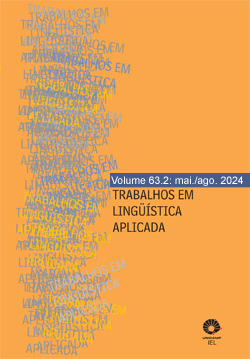Resumen
A pesar del creciente número de investigaciones sobre las emociones en Lingüística Aplicada, pocas de ellas se han centrado en cuestiones relacionadas con las emociones de los formadores de profesores de lenguas. En este artículo, presentamos los resultados de un estudio cualitativo que investiga las perspectivas de estos formadores (en dos universidades públicas brasileñas) sobre sus rutinas, bienestar y calidad de vida en sus espacios de trabajo. El material empírico se generó a través de cuestionarios y entrevistas a 18 y 13 participantes, respectivamente. Los resultados apuntan a tres temas principales: a) cómo se imagina el espacio universitario, qué se dice/no se dice generalmente sobre él; b) identidades relacionadas con el tiempo; yc) relaciones entre agencia, culpa y placer.Citas
AHMED, S. (2004). The cultural politics of emotion. Edimburgo: Edinburgh University Press.
ARAGÃO, R. (2022). A systemic view on emotion and reflection in language teacher education research. RBLA, v. 22, n. 1, p. 270-299.
ARAGÃO, R. (2006). Emoções e pesquisa narrativa: transformando experiências de aprendizagem. RBLA, v. 8, n. 2, p. 295-320.
BARCELOS, A. (2015). Unveiling the relationship between language learning beliefs, emotions, and identities. Studies In Second Language Learning And Teaching, v. 5, n. 2, p. 301-325.
BARCELOS, A.; ARAGÃO, R.; RUOHOTIE-LYHTY, M.; GOMES, G. (2022). Contemporary perspectives on research about emotions in language teaching. RBLA, v. 22, n.1, p. 1-16.
BENESCH, S. (2012). Considering emotions in critical English language teaching. Londres: Routledge.
BLOCH, C. (2012). Passion and paranoia: emotions and the culture of emotion in academia. Londres: routledge.
CANAGARAJAH, S. (2018). Translingual practice as spatial repertoires: expanding the paradigm beyond structuralist orientations. Applied Linguistics, v. 39, n. 1, p. 55-77.
DAMÁSIO, A. (2018). A estranha ordem das coisas: as origens biológicas dos sentimentos e da cultura. Trad. Laura Motta. São Paulo: Companhia das Letras.
FINARDI, K. (2022). As línguas e rankings no oscar da internacionalização das produções científicas latino-americanas. Estudos Linguísticos, v. 51, p. 147-161.
GEE, J. (2011). How to do discourse analysis: a toolkit. Londres: Routledge.
GOMES, G. (2022). Musing over the role of emotions to promote the exodus from the comfort zone in English language teaching and learning at a state university in Brazil. RBLA, v. 22, n. 1, p. 125-255.
KANNO, Y.; NORTON, B. (2003). Imagined communities and educational possibilities: introduction. Journal of Language, Identity, and Education, v. 2, n. 4, p. 241–249.
KRAMSCH, C. (2012). Imposture: A late modern notion in poststructuralist SLA research. Applied Linguistics, v. 33, n. 5, p. 483-502.
KRASHEN, S.; TERRELL, T. (1998). The natural approach: language acquisition in the classroom. Hertfordshire: Prentice Hall.
LA FORGE, P. (1971). Community language learning: a pilot study. Language Learning, v. 21, n. 1, p. 45-61.
MACINTYRE, P.; ROSS, J.; TALBOT, K.; MERCER, S.; GREGERSEN, T.; BANGA, C. (2019). Stressors, personality and wellbeing among language teachers. System, v. 82, p. 26-38.
MATURANA, H. (1998). Emoções e linguagem na educação e na política. Trad. José Fernando Campos Fortes. Belo Horizonte: Ed. UFMG.
NORTON, B. (2000). Identity and language learning: gender, ethnicity and educational change. Essex: Pearson.
NORTON, B.; TOOHEY, K. (2011). Identity, language learning, and social change. Language Teaching, v. 44, n. 4, p. 412-446.
OLIVEIRA, L; OLIVEIRA, A. (2022). Racialized emotions in language teaching: A case study with black female teachers. RBLA, v. 22, n.1, p. 37-67.
TALBOT, K.; MERCER, S. (2018). Exploring university ESL/EFL teachers’ emotional well-being and emotional regulation in the United States, Japan and Austria. Chinese Journal of Applied Linguistics, v. 41, n. 4, p. 410-432.
ZEMBYLAS, M. (2005). Discursive practices, genealogies, and emotional rules: a poststructuralist view on emotion and identity in teaching. Teaching and Teacher Education, v. 21, p. 935-948.

Esta obra está bajo una licencia internacional Creative Commons Atribución 4.0.
Derechos de autor 2024 Eduardo Henrique Diniz de Figueiredo, Denise Kluge, Helena Stürmer


